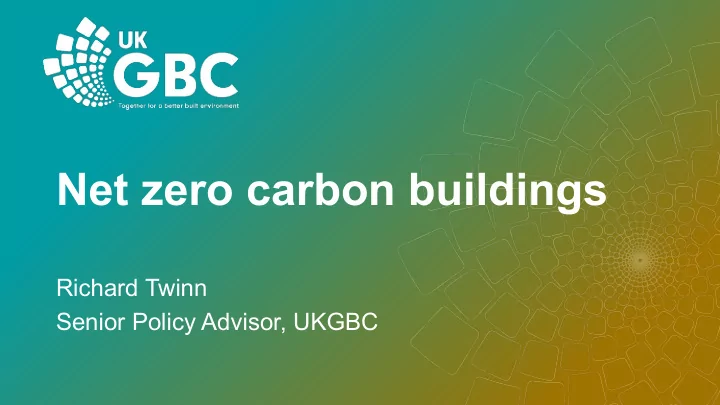

Net zero carbon buildings Richard Twinn Senior Policy Advisor, UKGBC
Net zero carbon buildings framework www.ukgbc.org/ukgbc-work/net-zero-carbon-buildings-a-framework-definitio n/
3 Name of presentation - Section name
Industry task group Acclaro Advisory AECOM Allies and Morrison Arup Atelier Ten BAM Construct UK Berkeley Group Bioregional BRE BuroHappold Carbon Credentials Energy Services Cundall Currie & Brown Derwent London UKGBC - Together for a better built environment EcoEnergy Insights, UTC Elementa Greengage Environmental Grosvenor Haringey Council Hawkins \ Brown Architects Hoare Lea Hodkinson Consultancy HTA Design LLP JLL Ltd Kingspan Insulation Ltd Landsec Lendlease Max Fordham LLP Redevco Skanska Skidmore, Owings & Merrill LLP Targeting Zero LLP The Carbon Trust Turley Twinn Sustainability Innovation Verco Willmott Dixon
Industry task group UKGBC - Together for a better built environment
Net zero carbon framework Overarching principles: 1. Polluter pays 2. Improve measurement and transparency 3. Encourage action today and tighten requirements over time UKGBC - Together for a better built environment
Net zero carbon scopes Building Building Beyond the End-of-life construction operation lifecycle Net Zero Carbon – Construction Net Zero Carbon - Operational Operational Operational Energy Maintenance, Carbon Construction Construction energy e.g. energy e.g. Demolition, repair, savings from products and products and heating, heating, waste, and material refurbishment processes processes lighting and lighting and disposal re-use and water use appliances appliances Net Zero Carbon – Whole Life Modules Module D Module C Modules A1-A5 Module B6 B1-B5 & B7 UKGBC - Together for a better built environment
Framework New buildings/ Buildings in major renovations operation Reduce construction impacts Reduce operational energy use Increase renewable energy supply Offset any remaining carbon Public disclosure = Achieve net zero carbon balance for construction = Achieve net zero carbon balance for operational energy UKGBC - Together for a better built environment
Future development Net zero carbon - whole life Renewable energy ‘Net zero guidance ready’ new buildings Energy ‘Time of use’ efficiency emissions Phasing out targets factors offsets UKGBC - Together for a better built environment
Planning policy playbook: sustainability in new homes www.ukgbc.org/ukgbc-work/sustainability-standards-new-homes/
1. Carbon & energy demand reduction 2. Mitigating overheating risk UKGBC - Together for a better built environment 3. Assuring performance
Recommendations 1. Energy and carbon improvements 19% carbon reduction on Part L 2013 Meet Part L requirements solely through energy efficiency 2. Address overheating risks Cooling hierarchy Screening, dynamic modelling for risks 3. Reduce the performance gap Developer’s internal quality controls Third party processes - BEPIT, NEF Assured Performance Toolkit Relevant certification - HQM, Passivhaus, Energiesprong UKGBC - Together for a better built environment
Local leadership: Energy and carbon Bedford (Emerging) 19% reduction on Part L 2013 (10 or more dwellings) 10% reduction on Part L 2013 (fewer than 10 dwellings) Brighton and Hove 19% reduction on Part L 2013 Cambridge 44% reduction on Part L 2006 ( 19% reduction on 2013) Greater Manchester 19% reduction on Part L 2013 (Emerging) 20% carbon reduction from renewables ‘Zero carbon’ from 2028 Guildford (Emerging) 20% reduction on Part L 2013 Eastleigh (Emerging) 19% reduction on Part L 2013 UKGBC - Together for a better built environment
Local leadership: Energy and carbon Eastleigh (Emerging) 19% reduction on Part L 2013 Havant (Emerging) 19% reduction on Part L 2013 Ipswich 19% reduction on Part L 2013 15% of energy from renewables (10 or more dwellings) London 35% reduction on Part L 2013 (Emerging) 10% from energy efficiency for resi 15% from energy efficiency for non-resi Milton Keynes 19% reduction on Part L 2013 (Emerging) Further 20% reduction from on-site renewable energy UKGBC - Together for a better built environment
Local leadership: Energy and carbon Oxford (Emerging) 19% reduction on Part L 2013 (adopted) 40% reduction on Part L 2013 (emerging) 50% reduction from 2026 ‘Zero Carbon’ from 2030 Reading (Emerging) 19% reduction on Part L 2013 Major developments ‘zero carbon’ including 35% reduction on Part L 2013 Suffolk Coastal 20% reduction on Part L 2013 (10 or more dwellings) (Emerging) UKGBC - Together for a better built environment
Local leadership: Embodied carbon London Referable schemes: (Emerging) 1. Whole Life-Cycle Carbon Assessment 2. Outline actions taken to reduce life-cycle emissions 3. Circular Economy Statement : • Re-use/recycling of materials from demolition and remediation • Disassembly and re-use of materials at the end of the building life • Waste management and handling UKGBC - Together for a better built environment
Thank you www.ukgbc.org/AdvancingNetZero ANZ@ukgbc.org #AdvancingNetZero
Recommend
More recommend